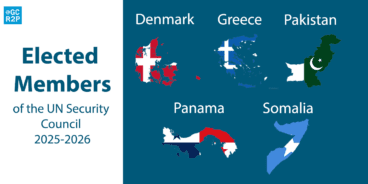Atrocity Alert No. 56: South Sudan, Central African Republic, and the UN Security Council Debate on the Protection of Civilians
Atrocity Alert is a weekly publication by the Global Centre for the Responsibility to Protect highlighting and updating situations where populations are at risk of, or are enduring, mass atrocity crimes.
South Sudan
On 19 May the United Nations released a report on violations and abuses of human rights committed in and around Yei, South Sudan, from July 2016 to January 2017. The UN documented 114 cases where the Sudan People’s Liberation Army (SPLA) and allied militias arbitrarily killed civilians who were perceived to be supporters of the SPLA-In Opposition (SPLA-IO). These cases included the targeted killing of a local school principal accused of supporting the rebels, and the arbitrary detention, rape and execution of two women and girl who were on their way to a local market. In another case from August 2016, seven SPLA soldiers attacked a funeral in the Lainya area, near Yei, beating mourners, raping a woman and killing her and another man.
According to the UN report, both pro-government forces and armed opposition groups, including the SPLA-IO, have targeted civilians on the basis of ethnicity and their perceived political affiliation. The UN report conceded that given the difficulty of accessing and properly investigating sites where other killings are alleged to have taken place, the actual number of fatalities is likely to be much higher.
Today, 24 May, the UN Security Council (UNSC) renewed the South Sudan sanctions regime. Despite the deteriorating security situation in the country, no new measures were imposed on the government or on the SPLA-IO and other armed groups. Given the persistence of deadly conflict in South Sudan, despite the peace agreement signed almost two years ago, the UNSC should immediately impose an arms embargo. The UNSC should also extend targeted sanctions against those who have command and control over forces responsible for targeting and killing civilians.
Central African Republic
On 15 May the armed group Front Populaire pour la Renaissance de la Centrafrique (FPRC) and an anti-balaka militia began fighting in Bria, Central African Republic (CAR), resulting in the deaths of 17 civilians. According to the UN Office for the Coordination of Humanitarian Affairs, as of 22 May Bria has nearly emptied, with 41,400 of the town’s 47,500 residents having been displaced. During the fighting, attacks were carried out against places of worship, local businesses and humanitarian compounds.
On 23 May the Prosecutor of the International Criminal Court issued a statement regarding the “serious crimes committed against civilians, peacekeepers and humanitarian workers” in CAR, noting that such crimes may fall under the jurisdiction of the court. The UN Mission (MINUSCA) and the CAR government need to increase efforts to end sporadic armed conflict in Bria and elsewhere, deploying adequate peacekeepers and accelerating the disarmament and demobilization process. The CAR government also requires ongoing international assistance to establish the Special Criminal Court, hold perpetrators of mass atrocities to account and end the cycle of violence.
UN Security Council Debate on the Protection of Civilians
On Thursday, 25 May, the UN Security Council will hold an Open Debate on the Protection of Civilians, focusing on attacks on healthcare in armed conflict. A number of current conflicts have been characterized by an alarming disregard for international humanitarian and human rights law, resulting in tremendous human suffering and potential mass atrocity crimes.
One of the most egregious violations of international humanitarian law is the increase in attacks on civilian infrastructure, including healthcare facilities and schools. During 2016, despite the adoption of UNSC Resolution 2286 on the protection of healthcare in armed conflict, Physicians for Human Rights documented 108 attacks on medical facilities in Syria alone. In that same year, the World Health Organization recorded attacks against medical care in 20 conflict-affected countries, resulting in the death or injury of 863 medical personnel.
As noted in the 3 May 2017 Atrocity Alert, all states must ensure that their forces consistently comply with their obligations under international law and uphold their responsibility to protect. All attacks on healthcare facilities and health workers should be impartially investigated and the perpetrators held accountable. The UN Secretary-General should also publicly list those states, and non-state armed groups, that deliberately target healthcare during armed conflict.
Read Next
Related Publications

Atrocity Alert No. 403: Israel and the Occupied Palestinian Territory, Sudan and the UN Human Rights Council

Sudan: UN Security Council must take urgent action to protect civilians
